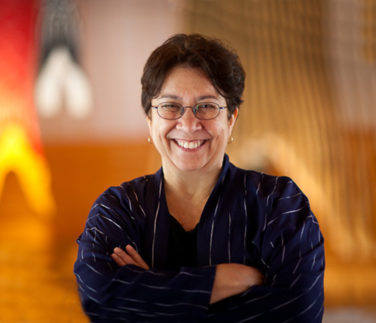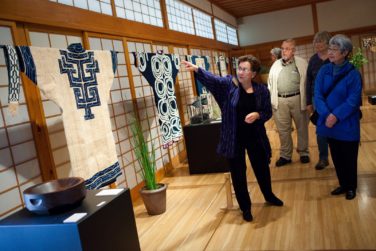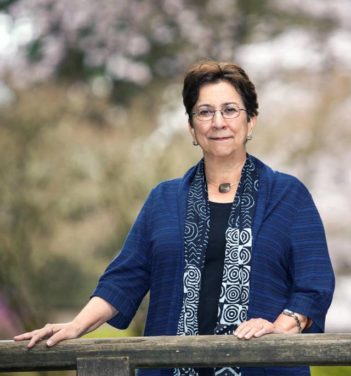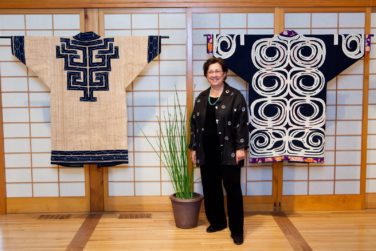 From the moment she entered the antique gate at Portland Japanese Garden, Diane Durston says she felt as if she was back in Kyoto, Japan, her home for 18 years.
From the moment she entered the antique gate at Portland Japanese Garden, Diane Durston says she felt as if she was back in Kyoto, Japan, her home for 18 years.
At the end of December, Diane Durston will end one chapter of her life’s work, and start another. She is retiring from her position as the Arlene Schnitzer Curator of Culture, Art, & Education at Portland Japanese Garden.
Durston is the Arlene Schnitzer Curator of Culture, Art and Education at the Garden, a title she has held since 2007.
“For many, a stroll through the Garden is the closest they will come to experiencing Japan— which is why what we do here is so important.”
“It all started with Steve Bloom, (the Garden’s CEO) inviting me to take a look at everything the Garden was doing and help him take things to the next level. He encouraged me to explore new directions in the Garden’s programming—and in doing that, to seek out the full potential of the Garden itself as a vehicle for
better understanding Japan.”
With a background in the study of Japanese arts and culture, and having worked previously for five years at the Portland Art Museum, Durston was eager to introduce art as a window into the culture.

Durston launched the Art in the Garden series of four special exhibitions a year—one for each of the four seasons—that would reflect the intersection of art and nature and introduce the importance of seasonality in Japanese art and gardens. The exhibitions would celebrate work influenced by the aesthetics of Japan or created in response to the Garden itself.
“Attention to the beauty of the changing seasons is an important part of Japanese culture. This was the beginning of our exploration of themes from within the culture for us to explore over the coming years. We’ve done entire years of programming with artists and craftsmen whose work speaks to the importance
of such concepts as living in harmony with nature, for example, and the idea of the ‘healing garden’ and other themes that Japanese gardens represent,” says Durston.
Now more than a decade later, the Art in the Garden program has successfully introduced the work of more than 75 artists representing Japan and its unique artistic traditions. The works come from internationally known artists—some of whom have been recognized as Living National Treasures in Japan, as well as rising young artists and artisans from all parts of the country.
Durston also oversaw the Garden’s cultural programming, reorganizing the annual family festivals, planning annual lecture series, and reorganizing the Garden’s library and arts collections.
 “Rarely in any field of work has one person had such a profound transformational impact on an organization and in fact an entire global field,” says Garden CEO Steve Bloom about Durston. “For more than a decade, Diane has created world class, innovative, thought provoking, and cutting edge art and culture programming unparalleled anywhere.”
“Rarely in any field of work has one person had such a profound transformational impact on an organization and in fact an entire global field,” says Garden CEO Steve Bloom about Durston. “For more than a decade, Diane has created world class, innovative, thought provoking, and cutting edge art and culture programming unparalleled anywhere.”
She served as the leading architect of the International Japanese Garden Training Center at Portland Japanese Garden, which this year received the National Programming Excellence Award by the American Public Gardens Association at its national conference this summer.
The desire to introduce the values and philosophies within the Japanese culture and spiritual connections that are Durston’s passion. “It’s about seeing the world from a different perspective, connecting with nature in the Garden first, and through that experience, discovering the essential spirit and beauty of another culture. The Garden physically immerses its visitors in that culture, and provides a context within which to understand its traditions and its arts,” she said.
 Durston is a lecturer, cultural consultant, curator, and educator. She is the author of three books and numerous essays and articles on the culture and traditional way of life in Kyoto. The New York Times has referred to her book Old Kyoto as a “Japan travel classic.” Her book “Wabi Sabi” expresses her belief that such concepts can be shared universally, illuminating our own natural appreciation of the simple, imperfect beauty of nature.
Durston is a lecturer, cultural consultant, curator, and educator. She is the author of three books and numerous essays and articles on the culture and traditional way of life in Kyoto. The New York Times has referred to her book Old Kyoto as a “Japan travel classic.” Her book “Wabi Sabi” expresses her belief that such concepts can be shared universally, illuminating our own natural appreciation of the simple, imperfect beauty of nature.
As with all great scholars, Diane will not be fully retiring as she has been offered the opportunity to write a series of books on Japanese craftsmanship and aesthetics. She will continue her deep connection with the Garden in the years to come as Curator Emeritus for Portland Japanese Garden.
“From helping with the preservation of traditional neighborhoods like Gion and other historic districts of Kyoto to her work as the Special Programs Producer for the National Gallery of Art in Washington, D.C. she has truly, truly changed the landscape of Japanese culture throughout the world,” said Bloom. “We all owe Diane Durston a debt of gratitude. In fact we will continue to find ways big and small to recognize, honor, and celebrate Diane and her life’s work.”